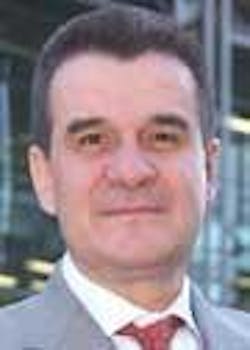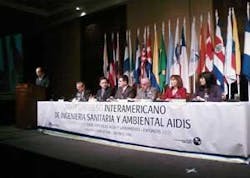Filling the Gap with UNAM’s Adalberto Noyola
By Carlos David Mogollón, Managing Editor
Universidad Nacional Autónoma de México’s Adalberto Noyola, after two years as AIDIS president, discusses challenges in Latin American water markets and the association’s work to help engineer solutions in austere times
Dr. Adalberto Noyola Robles is back to the classroom as an environmental engineering professor and director of UNAM’s Instituto de Ingeniería in Mexico City.
Dr. Noyola spent much of the past two years traveling on behalf of the Asociación Interamericana de Ingeniería Sanitaria y Ambiental (AIDIS) or, in English, the Inter-American Association of Sanitary & Environmental Engineering — which has some 30,000 members in 24 chapters throughout the Americas. In October, at the XXXI Congreso Interamericano de AIDIS in Santiago, Chile, he handed off AIDIS’ top job to Carlos Alberto Rosito, of Brazil’s Saint-Gobain Canalização Ltda. But he also offered a commentary on what the organization accomplished over the prior two years.
A native of San Luis Potosí, Mexico, Dr. Noyola studied engineering at the Universidad Autónoma Metropolitana-Azcapotzalco and Institut National de Sciences Appliquées in Toulouse, France, before beginning his career at the UAM-Iztapalapa. He’s a member of the Federación Mexicana de Ingeniería Sanitaria y Ciencias Ambientales (FEMISCA), Sociedad Mexicana de Biotecnología y Bioingeniería (SMBB), Colegio de Ingenieros Ambientales de México (CINAM), and the International Water Association (IWA). And he’s a former vice president and president of SMBB and FEMISCA.
Below is a sample of WWi’s interview with Dr. Noyola:
WWi:Give us, if you could, an overview on what we’ve seen accomplished here in Santiago at the Congreso Interamericano de AIDIS.
Noyola: In this Congress, we have three highlights besides the normal technical program. One was this forum — the first Foro Interamericano sobre Servicios de Agua y Saneamiento, or Interamerican Forum on Water and Sanitation Services. It was a good opportunity to discuss in Latin America the experience with water utilities and the type of management structures and how they can be improved. The other two were the Water Operator Partnership (WOPs), with PAHO, the CDC, and EPA, and the Water Safety Plans (WSPs), which we had a workshop last night covering. AIDIS has joined this initiative with the International Water Association.
WWi: Tell me about the Water Safety Plans?
Noyola: Well, it includes the International Water Association where Coca-Cola is financing part of it with a low-profile position. It is supporting this by helping translate the manual to Spanish and also providing funds in order that IWA has a manager for this program — a Spanish speaking manager — based in Peru and coordinated through PAHO’s Centro Panamericano de Ingeniería Sanitaria y Ciencias del Ambiente (CEPIS) offices in Lima to push these plans in the whole region. These are vulnerability assessment and prevention plans. I think through our network of national chapters we can help a lot of these partners in order to accomplish the goals. We have only nine experiences in the region to draw upon, so we have to multiply this many times over the next years.
WWi:Now, the idea for the WOPs began in a 2005 initiative as part of the 4th World Water Forum in Mexico City that became known as the Hashimoto Action Plan, correct?
Noyola: Yes, AIDIS helped to launch this in the region since last year when we started to work with the United Nations and UN Habitat as the owner of the program globally. In our region, the Inter-American Development Bank was very much interested. They loan to water utilities and so they are very much interested in this cooperation.
WWi: There was a big funding commitment to that as well. What was that?
Noyola: I don’t have the figure but, yes, it’s a new way to collaborate. It’s a partnering or mentorship program between large and small water and wastewater system operators from different regions, but without… how you say finas de lucra — not-for-profit — at least on the first part of the cooperation.
WWi: It’s not for commercial gain but as a cooperative exchange where each partner teaches something to the other.
Noyola: That’s it — just paying the expenses of traveling, but not earning money for that. That eventually could come in the second part of the cooperation. This could be a very effective way of improving water utilities in many parts of the region. We have very strong water utilities.
WWi: Some are also very big, such as SABESP, one of the largest in this hemisphere.
Noyola: Yes, we also have COPASA. And we have Aguas Andinas, which is private. In some countries you can find water utilities with a lot of experience that are efficient and effective. They can help other smaller utilities quickly improve their services. And this is supported by the Inter-American Development Bank, UN Habitat and the IWA, which is also participating because it pioneered the WOPs program in East Asia and Africa. But the partnerships are advancing much more rapidly here, even though we just started. You listen to Corinne Cathala, the IDB representative, and they have already five or six partnerships going. And the guy from COPASA mentioned others even with countries outside the region — in Africa with Angola and Mozambique. The opportunities are enormous. And AIDIS also, by providing linkages and the space for the proper approach, will take the lead with signing statements. We think these two initiatives — the Water Security Plans and Water Operator Partnerships — will help make it happen. With these two also, the water utilities may have a methodology or some means to improve their services without necessarily investing a lot of money.
Click here to read "An Interview with Dr. Adalberto Noyola on Latin America's Water Industry" in full in Q&A format.


